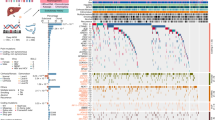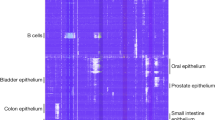Abstract
The FHIT gene, which spans the common fragile site FRA3B, has been shown to produce aberrant transcripts in a variety of tumor types. Homozygous deletions within the FHIT locus have been detected only in tumor-derived cell lines and LOH has been described in numerous primary tumors. Based on these findings and its location on 3p, FHIT has been proposed as a tumor suppressor gene. To further study the relationship of FRA3B to the findings regarding the FHIT gene and to determine the extent of FHIT mRNA alterations in early stages of tumor development, the status of the FHIT gene was evaluated in the premalignant condition of Barrett's esophagus and associated esophageal adenocarcinomas. FHIT expression was investigated by RT – PCR in normal esophageal, Barrett's metaplasia and adenocarcinoma tissues from 15 patients. Alterations of FHIT transcripts were observed in 12/14 (86%) of Barrett's metaplasia and in 14/15 (93%) of the adenocarcinomas from the same patients. Characterization of the altered transcripts revealed FHIT mRNA lacking one or more exons, with deletion of exons 5 – 7 being most frequent. Analysis of genomic DNA from 20 patients showed homozygous deletions involving exon 5 of FHIT in 4/20 (20%) esophageal adenocarcinomas, and 7/20 (35%) tumors demonstrated hemizygous loss. Genomic deletions also involved the BE758-6 locus, indicating that a large region is deleted. Fluorescence in situ hybridization (FISH) analysis demonstrated that this region of deletion is localized within FRA3B. Our results extend the range of tumor types in which altered FHIT transcripts have been demonstrated and show that these alterations can be seen in the premalignant stage of esophageal tumor development. These results indicate that the fragility and recombination-prone nature of FRA3B is related to tumor-specific chromosomal instability affecting the FHIT gene in esophageal adenocarcinoma development.
This is a preview of subscription content, access via your institution
Access options
Subscribe to this journal
Receive 50 print issues and online access
$259.00 per year
only $5.18 per issue
Buy this article
- Purchase on Springer Link
- Instant access to full article PDF
Prices may be subject to local taxes which are calculated during checkout
Similar content being viewed by others
Author information
Authors and Affiliations
Rights and permissions
About this article
Cite this article
Dagmar, M., Beer, D., Wilke, C. et al. Frequent deletions of FHIT and FRA3B in Barrett's metaplasia and esophageal adenocarcinomas. Oncogene 15, 1653–1659 (1997). https://doi.org/10.1038/sj.onc.1201330
Received:
Revised:
Accepted:
Issue Date:
DOI: https://doi.org/10.1038/sj.onc.1201330
Keywords
This article is cited by
-
Mutational spectrum of Barrett’s stem cells suggests paths to initiation of a precancerous lesion
Nature Communications (2016)
-
The FHIT gene product: tumor suppressor and genome “caretaker”
Cellular and Molecular Life Sciences (2014)
-
Fragile histidine triad protein: structure, function, and its association with tumorogenesis
Journal of Cancer Research and Clinical Oncology (2010)
-
Genome-wide analysis of genetic alterations in Barrett's adenocarcinoma using single nucleotide polymorphism arrays
Laboratory Investigation (2009)
-
High throughput tissue microarray analysis of FHIT expression in diffuse large cell B-cell lymphoma from Saudi Arabia
Modern Pathology (2006)



